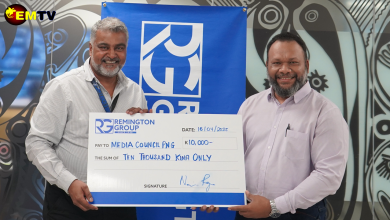Indigenous protests convulse Ecuador; oil fields stopped
Soldiers prepare to remove a road block during protests after Ecuador’s President Lenin Moreno’s government ended four-decade-old fuel subsidies, in Calderon near Quito, Ecuador, October 7, 2019. REUTERS/Ivan Alvarado

By Alexandra Valencia and Daniel Tapia
QUITO (Reuters) – Thousands of indigenous protesters paralysed roads around Ecuador and marched into capital Quito on Monday in a fifth day of action against government austerity measures that have sparked the worst unrest in years, resulting in 477 arrests.
The demonstrations also hit the OPEC nation’s oil sector, with state-run oil company Petroamazonas suspending operations at three of its fields after they were “taken” by “individuals not affiliated with the operations,” the Energy Ministry said in a statement.
The umbrella indigenous organization CONAIE said demonstrations would continue until President Lenin Moreno withdraws last week’s measure to eliminate fuel subsidies. The mobilization would coincide with a national strike planned for Wednesday.
Moreno, 66, who has abandoned his predecessor and one-time mentor Rafael Correa’s leftist policies, says he will neither tolerate disorder nor overturn the fuel price hike that is part of a liberal economic reform package.
As they entered Quito’s southern limits on foot, in trucks and on motorbikes, roughly 7,000 indigenous protesters were applauded and embraced by residents of the capital, who gave them food and water, according to Reuters witnesses.
“The president is hurting the people,” said Guillermo Montano, a 58-year-old retired member of the armed forces in Quito. “The measures are a blow to the people. Stuff is getting more expensive, and wages are not rising.”
Interior Minister Paula Romo told local Radio Quito detentions had risen to 477 since Thursday, mainly for vandalism, including the destruction of a dozen ambulances.
Indigenous and workers’ movements again blocked roads on Monday, from the Andean highlands to the Pacific coast, with stones, tires and burning branches.
The northern entry to Quito was paralysed.
Police erected barricades around the presidential palace, closing off the downtown area while Moreno presided over a government security council meeting to assess the crisis. But there was no police or military presence at the southern limits where the protesters entered the city in the evening.
In the southern city of Guayaquil, Ecuador’s financial capital, hundreds of protesters who marched down the main avenues chanting “Moreno, get out”, also faced little resistance from security forces, according to Reuters witnesses.
MORENO: ‘I WANT TO TALK’
The government says two dozen policemen have been injured in clashes with protesters, while a man died when he was hit by a car and an ambulance could not reach him through the barricades.
It said scores of indigenous protesters looted the warehouses of dairy company Parmalat Ecuador in Cotopaxi province on Monday, injuring some workers there. “We condemn aggression and looting, and any action that risks human life and public and private property,” it said in a statement.
Flower and broccoli farms were also attacked in Cotopaxi, officials said, accusing Correa supporters of being behind the trouble.
A state of emergency is in place.
Although he enjoys the support of business and the military, Moreno’s popularity has sunk to under 30%, compared with 70% after his 2017 election.
Indigenous-led protests brought down three presidents in the years before Correa’s rule.
In a national address on Sunday night, Moreno reiterated calls for dialogue. “I want to talk with the indigenous brothers, with whom we share causes,” he said, adding that resources would be set aside to help the poor and compensate for price rises.
Michael Kozak, the U.S. assistant secretary of state for Western Hemisphere Affairs, said the U.S. was monitoring events in Ecuador and rejected “violence as a form of political protest.”
“Dialogue and respect for rule of law are core democratic values and the best way for the people of Ecuador to enjoy greater economic prosperity,” Kozac wrote.
The government is struggling with a large foreign debt and fiscal deficit and earlier this year reached a $4.2 billion loan deal with the International Monetary Fund that hinges on belt-tightening reforms.
As well as ending fuel subsidies, the government is trimming the state workforce and planning some privatizations. Moreno says the fuel subsidies, in place for four decades, distorted the economy and cost $60 billion.
(Reporting by Alexandra Valencia, Jose Llangari and Carlos Garcia Rawlins in Quito, Cristina Munoz in Machachi, Alberto Fajardo in Cayambe, Yury Garcia in Guayaquil; Writing by Andrew Cawthorne and Luc Cohen; Editing by Mark Heinrich, Dan Grebler and Cynthia Osterman)
Copyright 2018 Thomson Reuters. Click for Restrictions.






